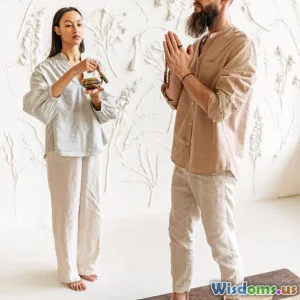
Why Daily Mindfulness Reduces Anxiety Better Than Meditation Alone
9 min read Discover how daily mindfulness practices can reduce anxiety more effectively than meditation alone through practical insights and real-world evidence. (0 Reviews)
Why Daily Mindfulness Reduces Anxiety Better Than Meditation Alone
Anxiety is an almost ubiquitous experience in modern society, with the World Health Organization estimating more than 264 million people worldwide suffer from anxiety disorders. If you’ve ever tried meditation to calm your mind, you might have noticed some relief—but it’s typically temporary or incomplete for many. So why does daily mindfulness practice often yield better anxiety reduction than meditation alone?
This article dives into the science and real-life applications of mindfulness steering away from a meditation-only approach. You’ll learn why integrating mindfulness into your everyday routine—not just during an assigned meditation session—creates a more profound and sustained impact on anxiety levels.
Understanding Anxiety and Its Cognitive Roots
Anxiety manifests as persistent worry, nervousness, and a heightened state of alertness. It results from how our brain processes threats, often amplifying perceived dangers out of proportion. This distortion is frequently linked to the default mode network (DMN) in the brain, which drives rumination and worry.
Traditional meditation primarily aims to calm this network by fostering focused attention. But is focused attention alone enough to intrusively alter the daily anxious thought patterns that emerge amidst life's chaos? Often, it isn’t.
What Is Daily Mindfulness? How Is It Different From Meditation?
While meditation is a dedicated time to disengage from distractions and focus inward, daily mindfulness embodies adopting an ongoing, moment-to-moment awareness throughout daily life. It’s not limited to sitting quietly for 10-20 minutes; it integrates into simple activities such as eating, walking, listening, or even doing daily chores.
Jon Kabat-Zinn, a pioneer in this field, defines mindfulness as “paying attention in a particular way: on purpose, in the present moment, and nonjudgmentally.” This orientation allows us to observe anxious thoughts without the emotional charge or automatic reactions that perpetuate anxiety.
Why Daily Mindfulness Reduces Anxiety Better
1. Continuous Regulation of Emotional Responses
Mindfulness in daily life encourages regulation of emotional responses as anxiety-provoking situations arise. Rather than waiting for a meditation session to reset your mind, you are training yourself to notice tension early and respond thoughtfully.
Researchers from Penn State University found in a 2016 study that mindfulness interrupted negative thought spirals more effectively than a single meditation session. Constant practice throughout the day acted like a buffer against escalating anxiety by reducing amygdala activation—the brain’s fear center.
2. Strengthening Cognitive Flexibility
Daily mindfulness enhances cognitive flexibility—the brain’s ability to shift perspectives and adapt to changing situations. Cognitive rigidity is often linked with persistent anxiety. Through mindfulness, you train yourself to observe thoughts without clinging or suppressing them, which weakens anxiety’s grip.
For example, during a stressful meeting, a person practicing daily mindfulness might notice feelings of nervousness without immediately escalating into catastrophic thinking, allowing rational responses to prevail.
3. Building Resilience via Habit Formation
Meditation alone usually occurs in isolated moments, often disconnected from real-life stressors. Daily mindfulness transforms this isolated practice into habitual emotional resilience. Like building muscle, daily use of mindfulness rewires neural pathways for calmer emotional processing.
A randomized controlled trial published in the Journal of Clinical Psychology (2018) reported significant anxiety reduction in participants who practiced informal mindfulness throughout the day compared to those who meditated only during set times.
4. Promoting Self-Compassion and Reduced Self-Judgment
Anxiety thrives on harsh self-criticism and unrealistic expectations. Regular mindfulness cultivates a compassionate inner dialogue by enabling you to witness thoughts without judgment. Meditation apps like Headspace and Calm include guided self-compassion practices with daily prompts rather than just static meditation exercises.
Clinical psychologist Tara Brach highlights in her teachings that mindfulness encourages a “radical acceptance” that calms anxiety by softening the tension between how things are and how we wish them to be.
5. Accessibility: Mindfulness Without Time Barriers
One common criticism of meditation is the time commitment beginners feel they must make. Daily mindfulness removes this barrier. By infusing mindfulness into routine activities such as brushing your teeth or driving, it becomes easier and more sustainable.
A 2019 survey published in Mindfulness journal stated that individuals who practiced mindfulness during daily activities reported higher satisfaction rates, less stress, and more consistent anxiety reduction.
Practical Tips for Injecting Mindfulness Into Your Everyday Life
To capitalize on the anxiety-reducing benefits of daily mindfulness, try the following approaches:
-
Mindful Breathing: Several times a day, even for a minute, stop and observe your breath consciously. Inhale deeply and exhale slowly to ground yourself in the moment.
-
Mindful Eating: Engage fully with your food’s texture, flavors, and aroma. Notice each bite instead of eating distractedly.
-
Body Scan While Doing Routine Tasks: Pay attention to sensations during dishes or showering, acknowledging tension or relaxation.
-
Single-Tasking: Focus entirely on one task at a time. Notice your level of engagement and gently bring your mind back when distracted.
-
Mindful Listening: During conversations, listen fully without preparing your response.
-
Check-Ins: Periodically throughout the day, ask yourself how you feel physically and emotionally, noticing sensations without judgment.
Conclusion: From Meditation to Mindful Living
Mindfulness integrated daily fosters an ongoing dialogue with your mental and emotional experiences. This continuous awareness disrupts anxiety cycles better than meditation practiced in isolation. By normalizing mindfulness beyond the cushion, you develop resilience, emotional regulation, and cognitive flexibility that reshape your relationship with anxious thoughts.
The journey from mindfulness as a meditation technique to mindfulness as a lifestyle choice is transformative. It’s accessible, scientifically validated, and deeply human. Embracing this holistic approach provides not just momentary calm but sustained emotional well-being—proving that daily mindfulness truly reduces anxiety better than meditation alone.
References
- Creswell, J. D. (2017). Mindfulness Interventions. Annual Review of Psychology, 68, 491-516.
- Tang, Y.-Y., Hölzel, B. K., & Posner, M. I. (2015). The neuroscience of mindfulness meditation. Nature Reviews Neuroscience, 16(4), 213-225.
- Goyal, M. et al. (2014). Meditation Programs for Psychological Stress and Well-being: A Systematic Review and Meta-Analysis. JAMA Internal Medicine, 174(3), 357-368.
- Lindsay, E. K., Young, S., Caputo, J., & Creswell, J. D. (2018). Acceptance-based interoceptive exposure reduces panic symptoms through decreased fear of bodily sensations. Journal of Clinical Psychology.
- Kabat-Zinn, J. (2015). Mindfulness for Beginners: Reclaiming the Present Moment—and Your Life. Sounds True.
- Brach, Tara. (2016). Radical Acceptance. Bantam.
Rate the Post
User Reviews
Popular Posts




















